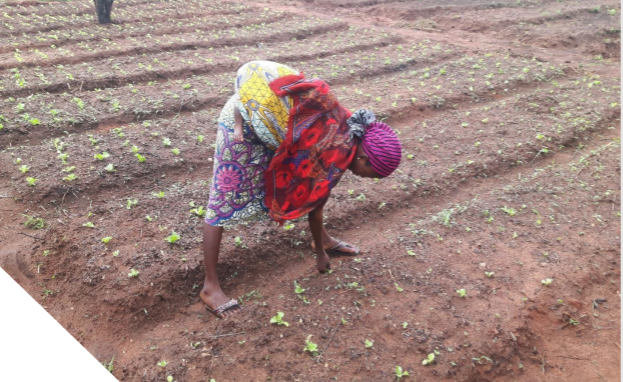In Benin, agriculture sector growth faces numerous challenges, such as land tenure issues, limited access to finance, low productivity, and decreasing soil fertility, all exacerbated by climate change. Temperature is projected to increase by 1-2°C in some regions. Between 1970 and 2019, spatial variation in precipitation across Benin was relatively low, with little difference in annual rainfall averages across various rainfall stations. However, average annual maximum and minimum temperatures showed a significant increase, indicating that Benin is experiencing the effects of climate change. This warming negatively impacts various sectors such as agriculture, water resources, energy, health, infrastructure and urban planning, tourism, forestry, and coastal areas.
Future climate projections from two climate models, one from the Commonwealth Scientific and Industrial Research Organisation (CSIRO) and the other from the Canadian Centre for Climate Modelling and Analysis (CCCma), indicate that annual precipitation will generally decrease by 2050 and increase by 2100, except under some scenarios where the models disagree. Monthly and annual temperature averages (mean, minimum, and maximum) show a warming trend in both models, with deviations from the norm ranging between 0.8 - 2.3°C.
Ultimately, the challenges climate change poses to Benin's agriculture sector include negative effects on agricultural productivity, food security, and farmers' livelihoods. Addressing these challenges requires investing in adaptation measures and leveraging digital solutions to build resilience and promote sustainable development.
Potential of Digital Solutions for Climate Change Adaptation in Agriculture
Digital solutions have the potential to significantly support climate change adaptation in the agriculture sector by enhancing the resilience of smallholder farmers. These solutions can provide vital information, decision-making support, and financial services that enable farmers to adopt climate-smart agricultural practices and mitigate the impacts of extreme weather events.
Various digital tools and technologies can help farmers adapt to climate change. Weather and climate services offer essential information for farmers to adjust their practices based on anticipated conditions or respond to impending extreme weather events. Data-driven agricultural services, which draw on diverse data sources, can assist decision-making at both macro and grassroots levels. Digital financial services such as credit and agricultural index insurance can provide farmers with the means to invest in climate-smart practices and a safety net against adverse weather events. Innovations like open satellite data, low-cost sensors, big data, and machine learning have facilitated the development of these digital climate resilience services.
Benin stands out as one of the few African countries that have developed both an e-agriculture strategy and an Artificial Intelligence strategy. These strategic initiatives indicate the country's commitment to harnessing the potential of digital solutions for adaptation to climate change in the agriculture sector. By proactively investing in digital agriculture and leveraging innovative technologies, Benin is well-positioned to address the challenges posed by climate change, ensuring the resilience and sustainability of its vital agricultural sector.
Knowledge Gap on the Digital Ecosystem in Support of Climate Change Adaptation in the Agriculture
Despite the growing interest in digital solutions for climate change adaptation in the agriculture sector, several specific knowledge gaps remain. These include the lack of a comprehensive overview of the potential of digital solutions for climate adaptation in the agricultural sector, as well as insufficient information on the enabling or hindering policy environment that impacts their development and implementation. Additionally, there is limited understanding of the actual climate risks and vulnerabilities that can be addressed by digital technologies and an absence of information about the country's richness in terms of existing and potential digital innovations for climate adaptation in the agricultural sector and how to scale them effectively.
Addressing these knowledge gaps is crucial for policymakers, investors, and stakeholders to make informed decisions and identify opportunities for investment and scaling of digital solutions. By bridging these gaps, stakeholders can better leverage the power of digital tools and technologies to support climate change adaptation, build a more resilient and sustainable agricultural sector, and optimize the use of resources. Furthermore, this will foster greater collaboration among stakeholders and facilitate a more targeted approach towards developing and deploying digital solutions for climate change adaptation in agriculture.
New Study by ACED in Partnership with GCA to Fill the Knowledge Gap
ACED has partnered with the Global Center on Adaptation (GCA) to address the knowledge gaps in the digital ecosystem for climate change adaptation in agriculture. In collaboration with the African Development Bank (AfDB), the GCA has launched the Africa Adaptation Acceleration Program (AAAP). This program focuses on four action areas (pillars) that address Africa's adaptation priorities and offer key opportunities to drive adaptation through transformative and innovative actions. One of the core objectives of the AAAP is to ensure the uptake and scaling of digital solutions to address climate adaptation and strengthen producers' resilience.
The study's objectives include evaluating Benin's digital agriculture and climate change adaptation ecosystem, identifying challenges, constraints, strengths, and opportunities for increasing investments, scaling digital climate services, and mapping promising digital initiatives for climate change adaptation. The study will also present two case studies of digital adaptation solutions implemented in Benin, highlight practical implications of digital agriculture and adaptation profiling data, propose concrete actions to attract more investments in digital climate services, and present a financial and technical model for implementing digital platforms to provide climate-related services and advice to farmers.
In summary, the benefits of this study are manifold. It will help decision-makers and stakeholders in Benin to better understand the current state of digital agriculture and climate change adaptation and identify potential areas for investment and scaling. The proposed action plan and feasibility study will serve as a roadmap for harnessing the potential of digital solutions in addressing climate risks and vulnerabilities in the agriculture sector. Ultimately, the study will contribute to developing more resilient and sustainable agricultural practices in Benin while ensuring that the opportunities offered by digital technologies are leveraged to the fullest extent possible.
Stay updated on the progress of this study and the report by following ACED on Twitter, and don't forget to subscribe to our newsletter for regular updates and insights!


